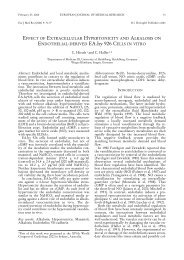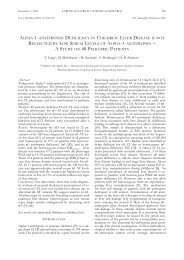European Journal of Medical Research - Deutsche AIDS ...
European Journal of Medical Research - Deutsche AIDS ...
European Journal of Medical Research - Deutsche AIDS ...
You also want an ePaper? Increase the reach of your titles
YUMPU automatically turns print PDFs into web optimized ePapers that Google loves.
June 27, 2007 EUROPEAN JOURNAL OF MEDICAL RESEARCH<br />
45<br />
A.50 (Poster)<br />
Transferring intermediary training HIV/<strong>AIDS</strong> to<br />
Hamburg: Signs <strong>of</strong> early success<br />
Robben K. 1 , Wienold M. 2 , Brayer W. 1 , Salmann R. 2 ,<br />
Migranten-Aids Projekt<br />
1 Kinder- und Familienzentrum Schnelsen, Hamburg, Germany,<br />
2 Ethno-medizinisches Zentrum Hannover, Hannover, Germany<br />
Introduction: The number <strong>of</strong> newly diagnosed people with<br />
HIV-infection from high prevalence countries has doubled in<br />
Hamburg since 2000. There is evidence for migrants to be at a<br />
particularly high risk <strong>of</strong> infection and to delay the use <strong>of</strong> German<br />
institutions (e.g. <strong>AIDS</strong>-service organizations). A higher<br />
level <strong>of</strong> discrimination <strong>of</strong> migrants with HIV is found in their<br />
own communities. These issues have been addressed effectively<br />
by training transcultural intermediaries in HIV/<strong>AIDS</strong><br />
prevention and care in Lower Saxony. Is a partnership able to<br />
establish training following this model elsewhere?<br />
Method: A proven model for HIV/<strong>AIDS</strong> prevention in migrants<br />
was adjusted and transferred to the site in Hamburg<br />
(11/05 to 02/07). Selected migrants were trained by experts<br />
(epidemiology, medicine, sexuality, policy and psychology).<br />
The project was evaluated through structured feedback during<br />
the training and by evaluating the group sessions.<br />
Results: 30 bilingual, socially integrated and committed migrants<br />
were selected to participate in the training and campaign.<br />
A curriculum based on 50 hrs <strong>of</strong> training was applied<br />
and followed by supervised group session prepared and evaluated<br />
each by two <strong>of</strong> the intermediator trainees. 24 intermediaries<br />
completed the training and were certified as transcultural<br />
HIV/<strong>AIDS</strong> intermediaries. The training provided insights into<br />
the cultural background <strong>of</strong> HIV/<strong>AIDS</strong> in the countries <strong>of</strong> origin<br />
(e.g. <strong>AIDS</strong> as a punishment in Africa). The campaign highlighted<br />
the singular capacities <strong>of</strong> transcultural intermediaries to<br />
(1) identify target groups and (2) successfully conduct community<br />
group sessions in their respective ethnic communities.This<br />
observation remained valid throughout the project (18 sessions).<br />
Group sessions reached over 200 migrants in ten languages.<br />
The project elicited highest public interest and further<br />
demonstrated demand and opportunities for continuing the<br />
campaign through new funding.<br />
Conclusions: Intermediaries successfully served as HIV/<br />
<strong>AIDS</strong> educators in their respective communities. Training<br />
transcultural HIV/<strong>AIDS</strong> intermediaries is now publicly recommended<br />
in Hamburg (Handlungsplan Integration des Hamburger<br />
Senats). In order to provide a perspective for a selfsustainable<br />
project in Hamburg further effort is needed.<br />
A.51 (Poster)<br />
Improved results <strong>of</strong> evaluation in intercultural<br />
settings: Participation <strong>of</strong> intermediaries in quality<br />
assurance and adaptation<br />
Wienold M. 1 , Kimil A. 1 , Robben K. 2 , Menckhaus B. 3 ,<br />
Sobiech C. 1 , Mönningh<strong>of</strong>f K. 1 , Salman R. 4<br />
1 Ethno-Medizinisches Zentrum, MAP-Team, Hannover,<br />
Germany, 2 Kinder- und Familienzentrum, Hamburg, Germany,<br />
3 Ethno-Medizinisches Zentrum, MiMi-Projekt, Hannover,<br />
Germany, 4 Ethno-Medizinisches Zentrum, Hannover,<br />
Germany<br />
Question: The heterogeneous population <strong>of</strong> migrants in Germany<br />
(reflecting changing patterns in the history <strong>of</strong> immigration;<br />
first and second generation) appear to know less about<br />
health issues than the native German population. The Ethno-<br />
<strong>Medical</strong> Centre in Hannover has established a model for evaluated<br />
health promotion by migrants for migrants. How can the<br />
tools be improved to better evaluate the impact <strong>of</strong> HIV/<strong>AIDS</strong><br />
prevention in migrant communties?<br />
Methods: Evaluation developed for health prevention campaigns<br />
in migrant communities in Germany (MiMi-Projekt)<br />
were adapted to the HIV/<strong>AIDS</strong> field following principles <strong>of</strong><br />
continuous quality improvement and community orientation.<br />
The tools were developed in a multi-cultural and multi-pr<strong>of</strong>essional<br />
team, followed by feedback from trained transcultural<br />
intermediaries and than translated (by intermediaries).<br />
The questionnaires for participants in community group sessions<br />
were bilingual. The validity <strong>of</strong> evaluation results was<br />
assessed. Data collected during a project in Hamburg (2006)<br />
were analysed using quantitative and qualitative methods.<br />
Results: The materials were reviewed and adapted by trained<br />
intermediaries into e.g. Pidgin English. Questionnaires were<br />
successfully applied in six languages. The bilingual texts allowed<br />
evaluation in the team (German is the lingua franca <strong>of</strong><br />
the project). A total <strong>of</strong> 21 community group session resulted<br />
in over 200 questionnaires returned reflecting ten different<br />
ethnicities (language groups). A preliminary evaluation <strong>of</strong><br />
115 questionnaires showed valid results relating to gender, recruitment,<br />
knowledge and feedback on quality <strong>of</strong> community<br />
group sessions and on information provided:<br />
(1)Female migrants were in the majority,<br />
(2)recruitment into community group sessions mostly worked<br />
through personal invitation,<br />
(3)basic knowledge is highly variable with evidence for relevant<br />
deficits (e.g. homophobia),<br />
(4)the feedback was highly positive. Open questions required<br />
translation into German for evaluation.<br />
Conclusions: Evaluation tools can be improved by making<br />
use <strong>of</strong> interemdiaries. Open questions remain to pose a particular<br />
obstacle for evaluation in this context. Standard criteria<br />
for community orientation in quality assurance may serve to<br />
further improve outcomes.<br />
A.52 (Poster)<br />
Intercultural Competence (IC) in the scope <strong>of</strong><br />
outpatient medical care for migrants living with<br />
HIV/Aids (MHA)<br />
Jansen K. 1 , Kleiber D. 1<br />
1 Free University Berlin, Institute for Public Health and psychosocial<br />
Health <strong>Research</strong>, Berlin, Germany<br />
Objective: MHA are said to be underrepresented in practices<br />
specialised on HIV, but only few data are existent for the German<br />
situation. As barriers for access and contenting diagnostics<br />
and treatment for MHA, culturally differing theories <strong>of</strong><br />
sickness and social interaction, language problems as well as<br />
material and legitimate restrictions are considered. A study<br />
was carried out to clarify the extent and terms <strong>of</strong> outpatient<br />
medical care for MHA. Factors <strong>of</strong> good medical practise regarding<br />
MHA were surveyed, too.<br />
Methods: In Berlin, all HIV specialised (N1=28) and a sample<br />
<strong>of</strong> regular (N2=841) practices were surveyed via a standardised<br />
questionnaire. Data were gained on structure <strong>of</strong> practices<br />
and composition <strong>of</strong> their migrated clientele, on communication<br />
and interaction problems (scale: 0 (no) - 9 (very<br />
high)) with MHA and on degree <strong>of</strong> IC within the practices. To





